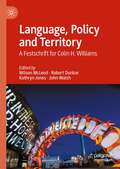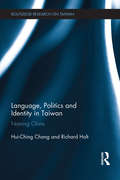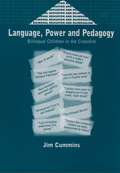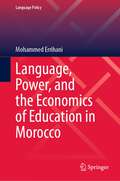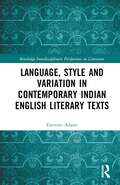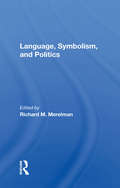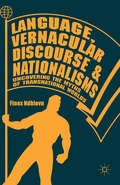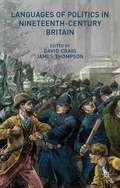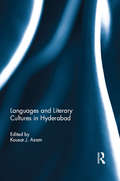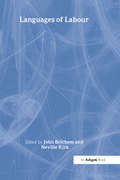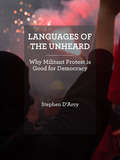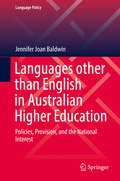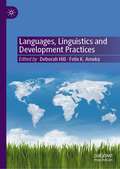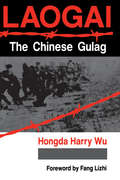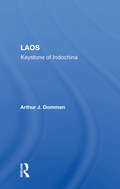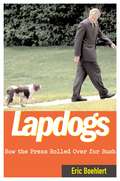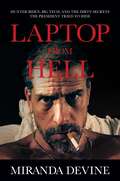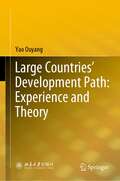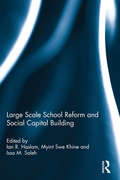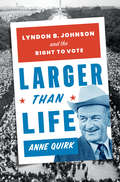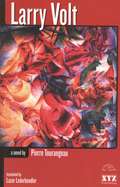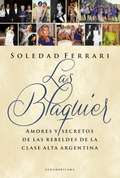- Table View
- List View
Language, Policy and Territory: A Festschrift for Colin H. Williams
by John Walsh Kathryn Jones Wilson McLeod Robert DunbarThis volume celebrates the contribution of Professor Colin Williams, an immensely important and influential scholar in the field of language policy for more than forty years. Eighteen chapters by former students, colleagues and collaborators address a range of topics involving different aspects of language legislation and language rights, governance, economics, territoriality, land use planning, and onomastics. Six chapters address policy issues in Professor Williams’s native Wales while others focus on Canada, Catalonia, Ireland and Scotland. The volume concludes with an Afterword by Professor Williams himself. The book will be suitable for postgraduates and researchers not only in the field of language policy and planning but also sociolinguistics, geography, law and political science.
Language, Politics and Identity in Taiwan: Naming China (Routledge Research on Taiwan Series)
by Richard Holt Hui-Ching ChangFollowing the move by Chiang Kai-shek and the Chinese Nationalist Party Kuomingtang (KMT) to Taiwan after losing the Chinese civil war to the Chinese Communist Party (CCP) in the late 1940s, and Chiang’s subsequent lifelong vow to reclaim the mainland, "China " has occupied—if not monopolized—the gaze of Taiwan, where its projected images are reflected. Whether mirror image, shadow, or ideal contrast, China has been, and will continue to be, a key reference point in Taiwan's convoluted effort to find its identity. Language, Politics and Identity in Taiwan traces the intertwined paths of five sets of names Taiwan has used to name China since the KMT came to Taiwan in 1949: the derogatory "Communist bandits"; the ideologically focused "Chinese Communists"; the seemingly neutral geographical designators "mainland" and "opposite shore/both shores"; and the ethnic and national label "China," with the official designation, "People's Republic of China." In doing so, it explores how Taiwanese identities are constituted and reconstituted in the shifting and switching of names for China; in the application of these names to alternative domains of Taiwanese life; in the waning or waxing of names following tides of history and polity; and in the increasingly contested meaning of names. Through textual analyses of historical archives and other mediated texts and artifacts, the chapters chart Taiwan's identity negotiation over the past half century and critically evaluate key interconnections between language and politics. This unique book will be of great interest to students and scholars of Taiwan studies, Chinese politics, communication studies and linguistics.
Language, Power and Pedagogy
by Jim CumminsPopulation mobility is at an all-time high in human history. One result of this unprecedented movement of peoples around the world is that in many school systems monolingual and monocultural students are the exception rather than the rule, particularly in urban areas. This shift in demographic realities entails enormous challenges for educators and policy-makers. What do teachers need to know in order to teach effectively in linguistically and culturally diverse contexts? How long does it take second language learners to acquire proficiency in the language of school instruction? What are the differences between attaining conversational fluency in everyday contexts and developing proficiency in the language registers required for academic success? What adjustments do we need to make in curriculum, instruction and assessment to ensure that second-language learners understand what is being taught and are assessed in a fair and equitable manner? How long do we need to wait before including second-language learners in high-stakes national examinations and assessments? What role (if any) should be accorded students' first language in the curriculum? Do bilingual education programs work well for poor children from minority-language backgrounds or should they be reserved only for middle-class children from the majority or dominant group? In addressing these issues, this volume focuses not only on issues of language learning and teaching but also highlights the ways in which power relations in the wider society affect patterns of teacher-student interaction in the classroom. Effective instruction will inevitably challenge patterns of coercive power relations in both school and society.
Language, Power, and the Economics of Education in Morocco (Language Policy #35)
by Mohammed ErrihaniThis volume provides a comprehensive understanding and assessment of language policy in education in Morocco. All aspects related to language policy and the effect on the education sector for more than half a century in Morocco are included in the book. The book traces the role that the linguistic medium has played in the educational system in Morocco since its independence from the French in 1956. It examines the role that various language policies have played in the educational sector and provides an in-depth analysis of the most recent language policy recognizing Berber, making it an official language and a mandatory subject in all schools. As such, this book is on the cutting edge of language policy as it also examines a policy that is still being rolled out.It also addresses the role of political pressure, and social and political conflict on language policy in Morocco, and how the linguistic medium has failed to guarantee the basic goals of equity, equality and social justice that assure a decent future for every citizen.
Language, Style and Variation in Contemporary Indian English Literary Texts (Routledge Interdisciplinary Perspectives on Literature)
by Esterino AdamiLanguage, Style and Variation in Contemporary Indian English Literary Texts is a volume which examines the linguistic and stylistic forms of Indian English in new fictional texts to explore the power of language to construct meaning, express identity, and convey ideology. Specifically, this study proposes the elaboration and application of postcolonial stylistics, i.e. an interdisciplinary methodology that uses different disciplines, such as literary linguistics and postcolonial studies as a critical lens to read contemporary Indian authors like Jeet Thayil, Deepa Anappara, Avni Doshi, Tabish Khair, and Megha Majumdar. The linguistic fabric of their fiction is investigated in a series of case studies, observing the stylistic rendition of a wide range of themes and tropes, such as the representation of Otherness, drug discourse, lament and the senses, which cumulatively portray aspects of the current Indian narrative scenario. The book develops ideas growing out of several disciplines to reach a fuller understanding of cultural phenomena in the postcolonial context, and by extension in the social world.
Language, Symbolism, And Politics
by Richard M. MerelmanFrom the "telerhetoric" of 30-second "sound bites" that deliver campaign slogans to the legal rhetoric that shapes our notions of social roles and values, or the official rhetoric of bureaucracies that legitimizes social problems, our perceptions of political reality are determined by the language and symbolism of the institutions of our culture. In the words of Murray Edelman, we view politics as "a series of pictures in the mind, placed there by television news, newspapers, magazines, and discussions." In Language, Symbolism, and Politics, leading political scientists, lawyers, and philosophers explore some of the multiple roles that symbolism and language play in political life. Edelman's ideas inspire discussions of political organization, political symbolism, elections, public policy, political culture, and political philosophy. But these essays also extend Edelman's work to encompass contemporary efforts in structuralism, deconstruction, textual analysis, post-structuralism, critical theory, and neo-Marxism. That so many important political topics can be tied together with the help of Edelman's analysis of language and symbolism is not only a tribute to his work but also ample testimony to the central place of language and symbolism in politics.
Language, Vernacular Discourse and Nationalisms: Uncovering The Myths Of Transnational Worlds
by Finex NdhlovuThis book examines the linguistic and discursive elements of social and economic policies and national political leader statements to read new meanings into debates on border protection, national sovereignty, immigration, economic indigenisation, land reform and black economic empowerment. It adds a fresh angle to the debate on nationalisms and transnationalism by pushing forward a more applied agenda to establish a clear and empirically-based illustration of the contradictions in current policy frameworks around the world and the debates they invite. The author’s novel vernacular discourse approach contributes new points of method and interpretation that will advance scholarly conversations on nationalisms, transnationalism and other forms of identity imaginings in a transient world.
Language, Youth and Identity in the 21st Century
by Jacomine Nortier Bente A. SvendsenThe language of young people is central in sociolinguistic research, as it is seen to be innovative and a primary source of knowledge about linguistic change and the role of language. This volume brings together a team of leading scholars to explore and compare linguistic practices of young people in multilingual urban spaces, with analyses ranging from grammar to ideology. It includes fascinating examples from cities in Europe, Africa, Canada and the US to demonstrate how young people express their identities through language, for example in hip-hop lyrics and new social media. This is the first book to cover the topic from a globally diverse perspective, and it investigates how linguistic practices across different communities intersect with age, ethnicity, gender and class. In doing so it shows commonalities and differences in how young people experience, act and relate to the contemporary social, cultural and linguistic complexity of the twenty-first century.
Languages Of Politics In Nineteenth-century Britain
by David Craig James ThompsonA comprehensible and accessible portrait of the various 'languages' which shaped public life in nineteenth century Britain, covering key themes such as governance, statesmanship, patriotism, economics, religion, democracy, women's suffrage, Ireland and India.
Languages and Literary Cultures in Hyderabad
by Kousar J. AzamThere is great interest in recent scholarship in the study of metropolitan cultures in India as evident from the number of books that have appeared on cities such as Delhi, Mumbai, Chennai and Kolkata. Though Hyderabad has a rich archive of history scattered in many languages, very few attempts have been made to bring this scholarship together. The papers in this volume bring together this scholarship at one place. They trace the contribution of different languages and literary cultures to the multicultural mosaic that is the city of Hyderabad How it has acquired this uniqueness and how it has been sustained is the subject matter of literary cultures in Hyderabad. This work attempts to trace some aspects of the history of major languages practiced in the city. It also reviews the contribution of the various linguistic groups that have added to the development not just of varied literary cultures, but also to the evolution of an inclusive Hyderabadi culture. The present volume, it is hoped, will enthuse both younger and senior scholars and students to take a fresh look at the study of languages and literary cultures as they have evolved in India's cities and add to the growing scholarship of metropolitan cultures in India.
Languages of Labour
by Neville Kirk John BelchemThis volume offers a multidisciplinary approach to the study of language in relation to the subject of history. The British and American contributors put forward the idea that language is a broadly based means of communication with contested and consensual meanings, and that such meanings must be revealed and evaluated by precise historical contextualisation of language and proper attention to established rules of historical method. The essays contend that the connections between the linguistic and the social must be rethought. The book aims to move beyond the unproductive fragmentation and relativism, the narrow textual range and the literal and anti-realist readings of the postmodern ’linguistic turn’ to offer a rigorous approach to the study of language and the subject of history.
Languages of the Unheard: Why Militant Protest is Good for Democracy
by Stephen D'Arcy“What we must see,” Martin Luther King once insisted, “is that a riot is the language of the unheard.” In this new era of global protest and popular revolt, Languages of the Unheard draws on King’s insight to address a timely and controversial topic: the ethics and politics of militant resistance. Using vivid examples from the history of militancy—including armed actions by Weatherman and the Red Brigades, the LA Riots, the Zapatista uprising, the Mohawk land defence at Kanesatake, the Black Blocs at summit protests, the occupations of Tahrir Square and Zuccotti Park, the Indigenous occupation of Alcatraz, the Quebec Student Strike, and many more—this book will be of interest to democratic theorists and moral philosophers, and practically useful for protest militants attempting to grapple with the moral ambiguities and political dilemmas unique to their distinctive position.
Languages other than English in Australian Higher Education: Policies, Provision, and the National Interest (Language Policy #17)
by Jennifer Joan BaldwinThis book researches the study of languages other than English, and their place in the Australian tertiary sector. Languages are discussed in the context of the histories of Australian universities, and the series of reports and surveys about languages across the second half of the twentieth century. It demonstrates how changes in the ethnic mix of society are reflected in language offerings, and how policies on languages have changed as a result of societal influences. Also discussed is the extent to which influencing factors changed over time depending on social, cultural, political and economic contexts, and the extent to which governments prioritised the promotion and funding of languages because of their perceived contribution to the national interest.The book will give readers an understanding as to whether languages have mattered to Australia in a national and international sense and how Australia’s attention to languages has been reflected in its identity and its sense of place in the world.
Languages, Linguistics and Development Practices
by Deborah Hill Felix K. AmekaThis edited book presents case-studies and reflections on the role of languages and their analytic study in development practices across four regions: Africa, Asia, Australia, and the Pacific. The authors highlight the importance of conceptual studies of languages and cultures, as well as language choice, for enhancing development practices, demonstrating the value that language analysis and the humanities can add to the already multi-disciplinary field of Development Studies. The chapters draw on the fields of linguistics, human geography, education, diverse economies, community learning, sociology, and anthropology, and topics covered include some significant areas of interest to sustainable human development: education, work, finances, age, gender; as well as a key approach to development (asset-based community development). Chapters on informal adult learning provide opportunities to explore how and why language and linguistic analysis is relevant to development projects. The volume aims to promote collaboration and interdisciplinary dialogue and should be of interest to academics, practitioners and students of language and development, and to those working in the field of development globally.
Lao People's Democratic Republic: Selected Issues and Statistical Appendix
by International Monetary FundA report from the International Monetary Fund.
Laogai: The Chinese Gulag
by Hongda Harry Wu Ted SlingerlandLaogai: The Chinese Gulag by Hongda Harry Wu. Translated by Ted Slingerland.
Laos: Keystone Of Indochina
by Arthur J DommenTheravada Buddhists in the lowlands and animists in the mountains, the people of Laos have wanted nothing more than to live at peace. Unfortunately, their country's location between two more powerful neighbors, Vietnam and Thailand, has made it the victim of invasion and domination since the fifteenth century. In this analytic introduction to Laos,
Lapdogs: How the Press Lay Down for the Bush White House
by Eric BoehlertLapdogs is the first book to demonstrate that, for the entire George W. Bush presidency, the news media have utterly failed in their duty as watchdog for the public. In blistering prose, Eric Boehlert reveals how, time after time, the press chose a soft approach to covering the government, and as a result reported and analyzed crucial events incompletely and even inaccurately. From WMDs to Valerie Plame to the NSA's domestic spying, mainstream fixtures such as The New York Times, CBS, CNN, and Time magazine too often ignored the administration's missteps and misleading words, and did not call out the public officials who betrayed the country's trust. Throughout both presidential campaigns and the entire Iraq war to date, the media acted as a virtual mouthpiece for the White House, giving watered-down coverage of major policy decisions, wartime abuses of power, and egregious mistakes -- and sometimes these events never made it into the news at all. Finally, in Lapdogs, the press is being held accountable by one of its own. Boehlert homes in on the reasons the press did not do its job: a personal affinity for Bush that journalists rarely displayed toward his predecessor, Bill Clinton; a Republican White House that threatened to deny access to members of the media who asked challenging questions or voiced criticism; and a press that feared being tainted by accusations of liberal bias. Moreover, journalists -- who may have wanted to report accurately on the important stories -- often found themselves at cross-purposes with media executives, many of whom were increasingly driven by economic concerns. Cowed by all of these factors, the media abandoned their traditional role of stirring up meaningful public debate. Boehlert asserts that the Bush White House never subscribed to the view -- commonly held by previous administrations -- that a relationship with the press is an important part of the democratic process. Instead, it saw the press as just another special interest group that needed to be either appeased or held at bay -- or, in some cases, squashed. The administration actively undermined the basic tenets of accurate and fair journalism, and reporters and editors accepted their reduced roles without a whimper. To an unprecedented degree, journalists too often stopped asking uncomfortable questions of people in power. In essence, the entire purpose and pursuit of journalism was sacrificed. Riveting in its sharp denouncement, supported by dozens of glaring and troubling examples of journalistic malpractice, Lapdogs thoroughly dissects the press's misconduct during Bush's presidency and gives voice to the growing public dismay with the mainstream media.
Laptop from Hell: Hunter Biden, Big Tech, and the Dirty Secrets the President Tried to Hide
by Miranda DevineAs seen on Tucker Carlson Tonight! The inside story of the laptop that exposed the president&’s dirtiest secret.When a drug-addled Hunter Biden abandoned his waterlogged computer at a Mac repair shop in Delaware in the spring of 2019, just six days before his father announced his candidacy for the United States presidency, it became the ticking time bomb in the shadows of Joe Biden&’s campaign. The dirty secrets contained in Hunter&’s laptop almost derailed his father&’s presidential campaign and ignited one of the greatest media coverups in American history. This is the unvarnished story of what&’s really inside the laptop and what China knows about the Bidens, by the New York Post journalist who brought it into the open. It exposes the coordinated censorship operation by Big Tech, the media establishment, and former intelligence operatives to stifle the New York Post&’s coverage, in a chilling exercise of raw political power three weeks before the 2020 election. A treasure trove of corporate documents, emails, text messages, photographs, and voice recordings, spanning a decade, the laptop provided the first evidence that President Joe Biden was involved in his son&’s ventures in China, Ukraine, and beyond, despite his repeated denials. This intimate insight into Hunter&’s dissolute lifestyle shows he was incapable of holding down a job, let alone being paid tens of millions of dollars in high-powered international business deals by foreign interests, unless he had something else of value to sell—which of course he did. He was the son of the vice president who would go on to become the leader of the free world.
Large Countries’ Development Path: Experience and Theory
by Yao OuyangThis book aims to propose a unique analytical framework to find out the general successful experience for large developing countries, which are defined with two main physical characters of large population and vast land. They are naturally crucial for the global development. Thirteen countries are chosen as large developing countries in this book, which are China, India, Russia, Brazil, Mexico, Indonesia, South Africa, Iran, Egypt, Pakistan, Nigeria, Ethiopia and Congo (DRC). On the basis of selecting massive data, the author analyzes the performance of large countries in terms of human resources, natural resources, market size and other factors. The book conducts the comparative study of large countries’ latecomer strength, transformation path and innovation strategy with the perspective of development economics. It presents a comprehensive overview about large developing countries
Large Scale School Reform and Social Capital Building
by Myint Swe Khine Issa M. Saleh Ian R. HaslamThis book introduces and explores the nature of large scale reform, and offers a fresh insight into the importance of social capital and professional development leadership for teachers and school management. It synthesizes research on the role of the professional development leader and the importance of social capital in schools, and examines its potential to impact large scale, system-wide, reform projects. The text presents a range of international examples and theories from renowned researchers and educationists, which illustrate the challenge of raising the prominence of education social capital in schools. Considering crucial research that informs effective adult learning interventions, underlying themes supporting constructivist and transformative interventions are identified and woven into the narrative. Factors and variables needed to encourage and implement initiatives are examined, and each section is accompanied by case studies from around the world. The book is split into five sections and twelve parts which include: -The Lesson of Large Scale Reform for Leadership Development-Assessment of Wide Scale Educational Reform Initiatives-Developing Social Capital through National Education Reform-System Improvement through Professional Learning Communities Large Scale School Reform and Social Capital Building will be of interest to policy makers and system reform leaders, along with researchers and postgraduate students with a focus on continuous professional development, educational reform and school leadership.
Larger than Life: President Lyndon B. Johnson And The Passing Of The Voting Rights Act
by Anne QuirkAn accessible, informed, and timely biography of Lyndon Johnson that centers his life and presidency around the passage of the Voting Rights Act. Keenly known for both his triumphs and his failures, Lyndon B. Johnson was one of the most complex and compelling presidents in US history. Anne Quirk’s biography alternates between chapters that follow LBJ’s childhood in rural Texas learning politics from his parents, his time teaching Mexican American students at a small-town school, and his days in Congress as majority leader and as vice president; and chapters that cover his work alongside civil rights leaders and the passage of the Voting Rights Act. An epilogue discusses the Supreme Court’s 2013 ruling that struck down key portions of the act. With engaging storytelling, Quirk paints a rich portrait of Johnson’s presidency, celebrating the accomplishments of his Great Society programs while refusing to shy away from his catastrophic decisions regarding Vietnam and the summer riots of 1967. Larger Than Life presents striking parallels to today’s political arena: an outsize character presiding over a divided nation—but to different ends.
Larry Volt: A Novel
by Lazer Lederhendler Pierre TourangeauShort-listed for the 2002 Governor General’s Award for Translation Larry Volt is one of the rare Quebec novels that deals with the FLQ crisis. Pierre Tourangeau captures a generation of young people who are rebelling, but above all, searching.
Las Blaquier: Amores y secretos de las rebeldes de la clase alta argentina
by Soledad FerrariUna de las autoras de «Máxima», vuelve con una investigaciónperiodistíca impecable. No todas las mujeres de la familia Blaquier sontan ricas y frívolas como se las ve en las revistas. Las Blaquier sonapasionadas, vehementes en sus convicciones y también sufridas. El apellido es el bien más preciado. Así lo cree Nelly Arrieta deBlaquier, una de las mujeres más poderosas de la Argentina y dueña delIngenio Ledesma. Gracias a la empresa de sus padres, conquistó a CarlosPedro Blaquier, quien llegó a convertir a Ledesma en el ingenio másimportante de Latinoamérica. Actualmente, a Blaquier se lo acusa dehaber colaborado con la última dictadura militar argentina.El exceso, la presión y la rebeldía las han llevado a lugares impensadospara ellas como la cárcel de Ezeiza. Pero las Blaquier nunca sevictimizaron. Supieron tomar lo mejor de las pequeñas y grandestragedias, aprendieron a cerrar las heridas y a resignificar los dolorespara intentar ser felices, a pesar de todo.Con este libro, Soledad Ferrari se consagra como la gran cronista de laclase alta argentina.
Las Buscadoras: Madres que buscan personas desaparecidas en México
by Noé ZavaletaEllas buscan a sus hijas, sus hijos, maridos y familiares. Es una historia cotidiana en nuestro país. Les empezaron a decir &“tesoros&”, a los restos óseos hallados en las múltiples fosas clandestinas de nuestro país. Principalmente en las entidades de Veracruz, Sinaloa, Guerrero, Jalisco, Michoacán y recientemente en Guanajuato. Este libro recopila, el viacrucis endemoniado de la búsqueda en vida y en muerte de los desaparecidos en México. Más de 70 mil ausencias y contando, acumulando, por cientos, por miles.Sus familiares se agruparon en &“Colectivos&”. No los une una filiación política, ni un gustos personales, tampoco una creencia religiosa, ni un estatus social, sino la &“ausencia&” de un ser querido. Un familiar &“tragado por la tierra&” en los cientos de agujeros negros que existen en México.The SeekersThey look for their daughters, their sons, husbands and relatives. It is an everyday story in our country. They will say "treasures" to the skeletal remains found in the many clandestine graves in our country. Mainly in the entities of Veracruz, Sinaloa, Guerrero, Jalisco, Michoacán and recently in Guanajuato. This book compiles the demonic via crucis of the search in life and in death for the disappeared in Mexico. More than 70 thousand absences and counting, accumulating, by hundreds, by miles.His relatives were grouped into "Collectives". They are not united by a political affiliation, or a personal taste, or a religious belief, or a social status, but the "absence" of a loved one. A relative "swallowed by the earth" in the hundreds of black holes that exist in Mexico.
